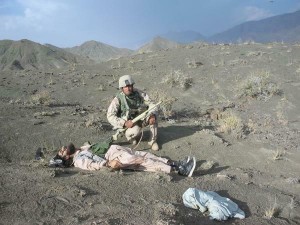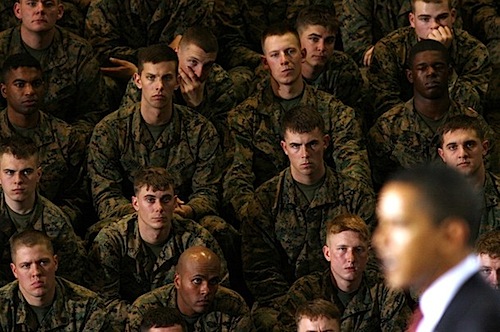News of the NZSAS’s imminent departure to Afghanistan, on its fourth deployment since 2001 but first since 2005, has occasioned a fair bit of commentary in the media. A Herald poll shows public opinion evenly divided on the issue. A broad swathe of Right and Left wing isolationists and pacifists oppose the move. Many believe it is just a sop thrown to US imperialism in order to curry favour. Others think it is about gas pipelines and Halliburton profits. The rationale for sending troops to Afghanistan has become muddled by American pronouncements that NZ should do so as a type of insurance in the event it is attacked, or as a down payment on an eventual bilateral FTA. John Key has not helped matters by stating that he does not want the SAS to undertake so-called “mentoring” roles for the Afghan Army because it is too dangerous (as if what they otherwise would be doing is not), and that he would like to withdraw the NZDF Provincial Reconstruction Team (PRT) in Bamiyan province because it costs too much to maintain (this in spite of its widely recognised success as a “hearts and minds” operation that is the essence of international peace-keeping and nation-building missions such as the ISAF mission in Afghanistan). Â He further clouds the issue by invoking the Jakarta and Mumbai bombings as reasons for the NZSAS deployment, even if the bombings had zero connection to events on the ground in Afghanistan (although I admit the possibility that some of those involved in the bombings may have attended Taleban protected al-Qaeda training camps in Afghanistan or the Pakistani tribal regions in the last decade or so). In making these utterances Mr. Key displays an apparent lack of understanding of what is really at stake in this dangerous game.
I have already posted here on the subject (see the Archive, especially here and here), and in recent days have tried to explicate further in the dedicated comments threads in places like Tumeke and Kiwiblog. Yet the rationale for why I believe that sending the NZSAS to and keeping the PRT in Afghanistan is justified appears to be lost in the general discussion. So let me phrase things in a different way, for purposes of clarification: what is going on in Afghanistan is a two-level game.
One one level there is the original ISAF mission. That mission was and is to deny al-Qaeda cadres and militant Taleban safe havens inside Afghanistan so that they do not pose a threat to the local population and cannot use Afghan territory to stage cross-border assaults on Pakistan and other neighbouring Central Asian republics. The concern with the militant Taleban, as opposed to their more “moderate” counterparts (read: nationalist or tribal), is that they have greater ambitions than re-gaining political control of Afghanistan. Instead, the militant Taleban and their al-Qaeda allies seeks to establish a Caliphate throughout Central Asia and beyond. They particularly want to gain control of nuclear-armed Pakistan, but even that is just a short-to-medium term goal. They have, in other words, imperialist ambitions of their own. These ambitions are not only opposed by the US, UN, and NATO. They are opposed by China, Russia, India and all Asian states that see the ripple effect extending towards them. In fact, they are opposed by virtually all of the international community with the exception of failed states such as Somailia and the Sudan (which have now become the new locus of al-Qaeda activity).
Worried about the repercussive effects that a Taleban victory in Afghanistan would have throughout Central Asia, the NATO-led, UN sanctioned ISAF mission has been successful at eliminating al-Qaeda as a military threat in the country, and is essentially now engaged in a grand scale pincer movement along with the Pakistani military that is designed to push Taleban on both sides of the common border into geographically defined kill zones from which they cannot escape. In parallel, ISAF and UN-led civilian assistance groups are attempting to engage moderate Taleban elements in order to establish a durable cease-fire that will permit the second level of the game to be played.
The second level game is oriented towards establishing a moderate Islamic regime with centralised authority over Afghanistan, one that will balance secular rights with religious freedoms and traditional privileges in accordance with the Universal Declaration on Human Rights. This a minimalist construction of the game; that is, it pretends to go no further than what is stated. It does not imply that the objective is to establish a secular democracy in the country. It does not pretend that centralised authority will mean central government monopoly of organised violence in the tribal hinterlands. It does not propose the blanket elimination of traditional forms of authority or social mores. Instead, it merely seeks to create the structural and political conditions for the establishment of peace, a peace that in turn will deny Islamic extremists the fertile territory for recruitment and sanctuary. It involves promoting electoral forms of political contestation, but more importantly, it pursues infrastructural development, to include educational, health and nutritional programs as well as the civil-military engineering projects required for their implementation and expansion.
To be sure, endemic corruption, the Karzai regime’s limited legitimacy outside of Kabul, the persistence of the opium trade, the ongoing presence of warlord-dominated fiefdoms, and the abject primitivism of many parts of the country make the second game seemingly impossible to achieve, and greatly complicate the achievement of the first game. Yet just because other foreign incursions have been defeated does not necessarily mean that this one is inevitably doomed to fail. For one thing, this is an international effort, not the expansionist project of a single imperial state. For another, because of its developmental and humanitarian focus, it does have a fair bit of internal support as well as that of neighbouring countries, factors that did not obtain in previous instances of occupation.
These two games are now being played out simultaneously, in overlapped fashion. The first is needed for the second to be successful (i.e., the combat work of such as the NZSAS is needed for PRTs to be successful). Yet the second is needed for the first to advance sufficiently so that an “exit strategy” is feasible. That will take a long time, at a minimum at least another five years and probably more. Any upgrade or renewal of the NZDF commitment to Afghanistan must take account of this fact.
Thus, when considering the “why” of NZ’s deployment of troops to Afghanistan, the debate should focus on the two levels of the ISAF “game,” and whether NZ has a stake in either. I have already stated that I believe that there are moral and practical reasons why NZ should, as an international citizen, contribute to the ISAF mission on both levels. Others disagree on either or both counts. Â The main point, however, is that Mr. Key and his advisors in the MoD and MFAT develop a clear and comprehensible rationale for why NZ should put its soldiers at risk in Afghanistan, which in turn is as much a function of informed public interest as it is of diplomatic necessity.



